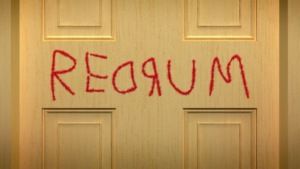News
Childhood imaginary friends nothing for parents to worry about, concludes Danish research
This article is more than 7 years old.
Kids with invisible pals are very rarely disturbed and likely to be more creative and visionary than average

I don’t care if your imaginary friend does say it’s spelled correctly
Randolph had Hopkirk (or was it the other way round), Danny Torrance from ‘The Shining’ had Tony (with the talented finger), Lizzie Cronin had Drop Dead Fred (we wish she hadn’t), and a nameless narrator had Tyler Durden – that last one is a spoiler, but you would have to google it, so you’re probably safe.
All four, of course, are imaginary friends – a supernatural phenomenon that has become as commonplace and accepted in childhoods as fairies at the bottom of the garden, the Tooth Fairy and a certain individual from up north who should not be named.
Most assume the imaginary childhood friends are a product of loneliness, but a new analysis carried out by a PhD researcher at Roskilde University suggests that they signal out “creative and visionary” kids, and that the invisible pals play a significant part in the child’s development, reports Videnskab.
From personal experience
Thomas Gitz-Johansen’s analysis is partly inspired by research carried out by Professor Ivy Schousboe from the University of Copenhagen, who herself had an imaginary childhood friend, in the 1980s and 90s.
In fact, she had three: Igalon, Labberis and Vablum.
“Igalon was a dangerous guy, cheeky as a butcher’s dog. He climbed up on the dining table and nudged at a heavy oak lamp,” she revealed in her research.
“Labberis and Vablum were two very gentle female characters who slept with me and made me feel safe.”
Like Gitz-Johansen, Schousboe concluded that children with imaginary friends had no specific problems, and that helping their friends to solve problems helped them to develop.
Fewer invisible pals in modern age
Gitz-Johansen concludes the children are not more lonely than average, and that they are fully aware that the friends are not actually real.
“The children may mention their invisible friends as if they can really see them, but they are well aware they are not part of any reality,” he told Videnskab.
“Unlike adults, some young children perceive imagination as equally important as reality.”
It also interesting to note, he says, that there have never been any published figures regarding what percentage of children have them.
Nevertheless, most experts concur that fewer children have imaginary friends today compared to previous years – most probably because they are less bored in the age of the smartphone – and that most grow out of them by the time they are eight years old.










































